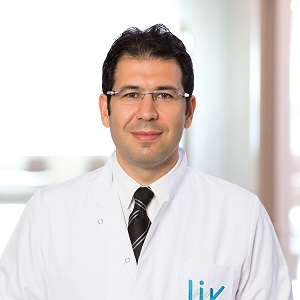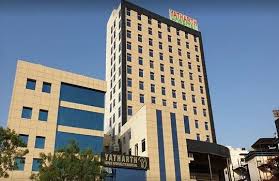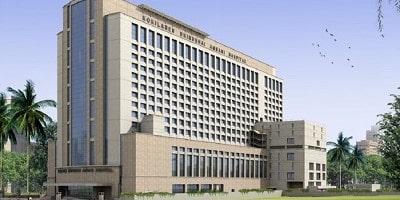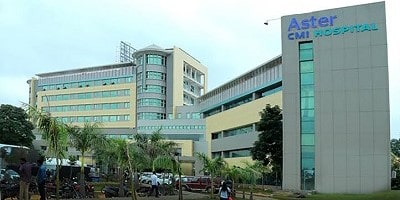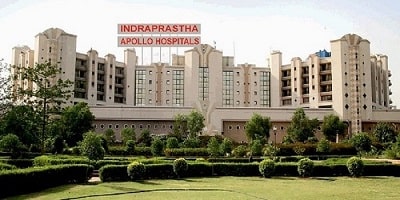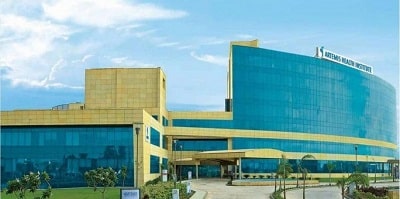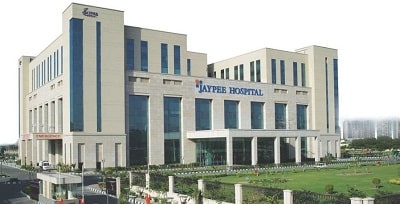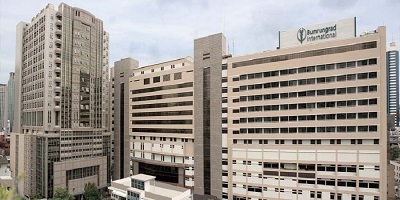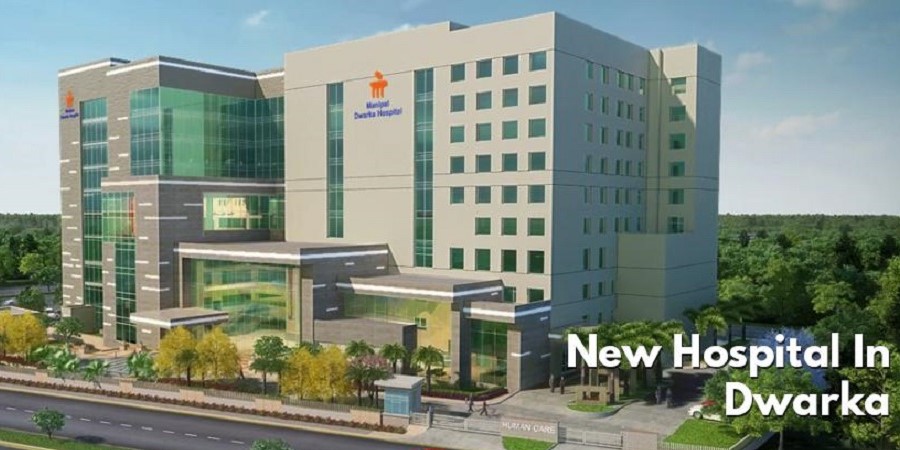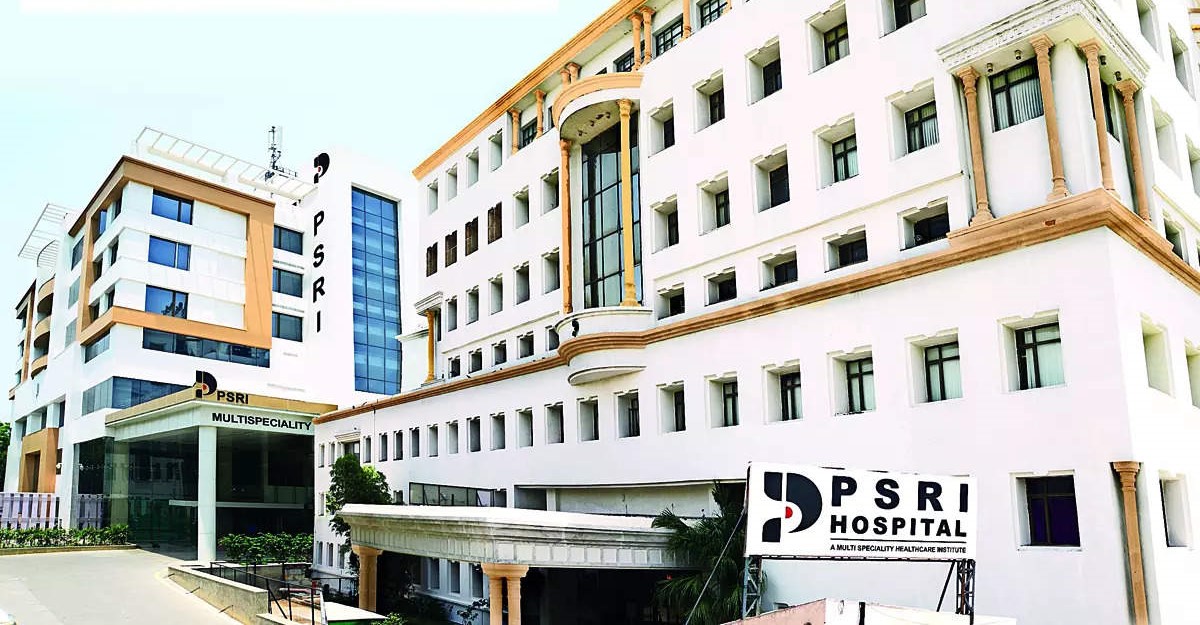
Duration of Treatment
usually takes 3 to 4 hours.
Days of Stay
Usually 5 to 6 days at the hospital and 20 days outside the hospital.
Anesthesia
General anaesthesia.
Cost
8000 to 18000 USD
How much does Bone Cancer Treatment Cost in India?
"Looking for Bone Cancer Treatment Cost in India or Top 10 Cancer Hospital at an affordable cost in different cities like Delhi, Mumbai, Chennai, Kolkata, and Bangalore? Here, we answer the question and explain how to choose the best cancer doctors list for better results. Still, have questions? SUBMIT ENQUIRY
We have also shortlisted the list of the best hospitals for bone cancer treatment and doctors based on Hospital accreditations, experience & qualification of surgeons, success rates of procedures, and patient testimonials.
- Bone surgery Cost: Starting from 8000 to 18000 USD
- Radiation Therapy Cost: Starting from 3,800 to 5800 USD
- Chemotherapy Cost: Starting from 300 to 600 USD (per cycle depending on drug choice)
- Hotel Cost Near Hospital - starting from 18 to 50 USD ( as per hotel services)
- Food Cost - starting from 20 to 30 USD (per day )
- Miscellaneous cost - 20 USD (per day)
- It's a rough estimate, final treatment will plan after the fresh evaluation reports.
- In India, Bone Cancer Treatment Costs can vary as per the diagnosis, patient conditions, surgeon experience, Implant quality, hospital facilities, and city.
- To make an appointment, learn more about Bone cancer, read the below information, or call / WhatsApp/ Viber - our experts to answer at +91 9582708782. Still, have questions? SUBMIT ENQUIRY
Who is the best Oncology Surgeons in India?
Click the below link for more details:
- DR.SURRENDER KUMAR DABAS – Oncologist Surgeon
- Dr. Arun Prasad - Oncologist Surgeon
- Dr. Ashwin Rajagopal - Oncologist Surgeon
- Dr. Vedant Kabra - Oncoligist Surgeon
- Dr. Subodh Chandra Pande - Radition and Cyberknife
- Dr. B Niranjan Naik - Oncoligist Surgeon
- Dr. Mahesh Bandemegal - Oncologist Surgeon
- DR.S HAKKU - Radiation Oncology
- DR.S M SHUAIB ZAIDI – Oncologist Surgeon
- DR.HARIT CHATURVEDI – Oncologist Surgeon
- DR.KAPIL KUMAR – Oncologist Surgeon
- DR.RAJESH KAPOOR - Oncologist Surgeon
Which is the best hospital for Bone Cancer Treatment in India?
- MANIPAL HOSPITAL
- BLK HOSPITAL
- MAX HOSPITAL
- JAYPEE HOSPITAL
- APOLLO HOSPITAL
- FORTIS ESCORT HOSPITAL
- GLOBAL HOSPITAL
- HCG CANCER HOSPITAL
- ARTEMIS HOSPITAL
- MEDANTA HOSPITAL
- ASTER HOSPITAL
- YASHODHA HOSPITAL
- GLOBAL HOSPITAL
- NARAYANA HOSPITAL
Why did you choose Peace Medical Tourism?
We are one of the best healthcare services providers with more than 10 years of experience in providing the best treatment at an affordable cost and guide our international patients to choose the top destination as per the patient's budget and treatment.
- Comprehensive and 100% transparency.
- Help to Choose the Best Option for Cancer Treatment.
- Very highly skilled cancer surgeon in India team.
- World-class technology for surgery.
- The high success rate of procedures with international standards.
- Affordable Cost of Bone treatment in India.
What is Bone Cancer?
Bone cancer is a type of cancer that starts in the cells that make up the bones. It can develop in any bone in the body but most commonly affects the long bones of the arms and legs. Bone cancer is relatively rare compared to other types of cancer.
Types of Bone Cancer
Bone cancer can be categorized into several types, including:
- Primary Bone Cancer: Cancer that begins in the bones. The main types include:
- Osteosarcoma: The most common type, usually affecting children and young adults. It typically starts in the ends of long bones.
- Ewing Sarcoma: Often found in children and teenagers, it usually starts in the bones but can also occur in soft tissue around the bones.
- Chondrosarcoma: Develops in the cartilage cells and is more common in adults.
- Chordoma: A rare type that usually occurs in the bones of the spine and the base of the skull.
- Secondary (Metastatic) Bone Cancer: Cancer that has spread to the bones from another part of the body, such as the breast, prostate, or lung. This is more common than primary bone cancer.
Diagnosis
To diagnose bone cancer, doctors may use a combination of the following tests:
- Imaging Tests: X-rays, CT scans, MRI, PET scans, and bone scans to detect abnormalities in the bones.
- Biopsy: Removing a small sample of tissue from the affected bone to examine under a microscope.
- Blood Tests: To check for certain markers that may indicate bone cancer.
Still, have questions? SUBMIT ENQUIRY
What are the Bone cancer signs & symptoms?
- Bone pain
- Swelling and tenderness
- Broken bone
- Fatigue
- Unintended weight loss
What is the risk factor of Bone cancer?
- Chemotherapy for another cancer.
- Genetic disorder.
- Previous radiation therapy.
- Benign tumors or other bone conditions.
- Radiation therapy for cancer
How do you Prepare for Bone cancer treatment?
- First, you have to choose the best hospital for cancer treatment in India at an affordable cost for better results.
- The cost of Bone cancer treatment in India starts from 8000 to 18000 USD depending upon the surgeon's experience, procedures, hospital facility, and city.
- The patient is required to go for a Pre-surgery check-up to do some blood test, ECG for a Cardiac check-up, and urine tests to know he /she is fit for surgery or not.
- Before the operation, you’ll be asked to sign a consent form, which gives the oncology surgeon permission to carry out the treatment.
- The doctor should be informed about any medication that the patient may be taking.
- The patient is admitted to the hospital on the same days before the procedures and advised to remain empty stomach/Fasting.
- Thinner medicines have to stop before ten days of surgery.
- Most of the patients are operated on under epidural or spinal anesthesia where their legs are numbed and a fine tube is put in the back through which anesthetic agents keep dripping in. This also controls pain in the postoperative period
How is Bone cancer surgery procedure done?
To identify the diagnosis doctor advised to go for complete evolution - usually, blood investigation, Biopsy, X-ray, ultrasound, (CT) scans, magnetic resonance, (MRI) imaging or PET scan. Before surgery, the surgeon and anesthesia will guide you about the benefits and risk factors of Spine Scoliosis surgery.
The treatment options for your bone cancer are based on the types and stages of cancer.
- Surgery- Surgery is helping to treat most stages of BONE CANCER. The main aim of surgery is to remove a tumor, bone tissue and remove a limb.
- Chemotherapy- Chemotherapy helps to kill the cancer cells and stop the Bone cancer from recurrence. Patients usually receive a combination of chemotherapy drugs. Chemotherapy is not currently used to treat chondrosarcoma.
- Radiation therapy - Radiation therapy for bone cancer uses high-radiation to destroy cancer cells. Radiation therapy will be given after surgery. It is often used to treat chondrosarcoma, which cannot be treated with chemotherapy.
Prognosis
The prognosis for bone cancer varies widely based on several factors, including the type and stage of the cancer, the patient’s age and overall health, and how well the cancer responds to treatment. Early detection and advances in treatment have improved survival rates for many types of bone cancer.
Support and Resources
Living with bone cancer can be challenging, but many resources are available to help patients and their families, including support groups, counseling services, and educational materials from cancer organizations.
How to do Post care for Bone cancer surgery?
Post-operative care for bone cancer surgery is crucial to ensure proper healing, manage pain, and prevent complications. Here are some general guidelines for post-surgery care:
Immediate Post-Operative Care
- Pain Management: Pain relief is essential after surgery. This may include prescribed painkillers or medications to manage inflammation.
- Wound Care: Keep the surgical site clean and dry. Follow your surgeon's instructions on how to care for the incision, including when to change dressings.
- Monitoring for Infection: Watch for signs of infection, such as redness, swelling, warmth, or discharge from the wound, and report any concerns to your healthcare provider immediately.
- Hospital Stay: Depending on the surgery's complexity, you may need to stay in the hospital for a few days for close monitoring and initial recovery.
At-Home Care
- Follow-Up Appointments: Attend all scheduled follow-up appointments with your surgeon and oncologist to monitor your recovery and address any issues.
- Physical Therapy: Engage in physical therapy as recommended to regain strength and mobility in the affected limb. Your therapist will provide exercises tailored to your specific needs.
- Activity Restrictions: Follow your surgeon's advice on activity restrictions to avoid putting too much strain on the healing bone and surgical site. Gradually increase activity levels as guided by your healthcare team.
- Nutrition: Maintain a balanced diet rich in vitamins and minerals, especially calcium and vitamin D, to support bone healing and overall health.
- Medications: Continue taking any prescribed medications, including pain relievers, antibiotics, or other drugs as directed by your healthcare provider.
Long-Term Care
- Rehabilitation: Continue with physical and occupational therapy to improve function and adapt to any physical changes resulting from the surgery.
- Bone Health: Follow strategies to maintain bone health, such as regular exercise, a healthy diet, and avoiding smoking and excessive alcohol consumption.
- Monitoring for Recurrence: Regularly monitor for any signs of cancer recurrence through follow-up imaging and blood tests as advised by your oncologist.
- Emotional Support: Seek emotional and psychological support through counseling, support groups, or talking to loved ones, as dealing with cancer and surgery can be emotionally challenging.
Specific Instructions
- Care for Prosthetics or Implants: If you received a prosthetic or implant, follow specific care instructions provided by your surgeon to ensure proper function and longevity.
- Lifestyle Adjustments: Make any necessary lifestyle adjustments to accommodate changes in mobility or physical capabilities. This may include modifications to your home or work environment.
Always follow the specific advice and instructions given by your healthcare team, as individual cases and recovery plans can vary significantly based on the type and extent of surgery performed.
What is the Success rate for Bone cancer Surgery?
The success rate for bone cancer surgery depends on several factors, including the type and stage of the cancer, the patient's overall health, and the specific surgical approach used. Here is an overview of the factors affecting the success rate:
Factors Affecting Success Rate
- Type of Bone Cancer:
- Osteosarcoma and Ewing sarcoma generally have different success rates compared to other types of bone cancer such as chondrosarcoma or fibrosarcoma.
- Stage of Cancer:
- Early-stage bone cancers have higher success rates compared to advanced stages where the cancer has spread (metastasized).
- Surgical Margins:
- Achieving clear surgical margins (no remaining cancer cells at the edges of the removed tissue) significantly improves the success rate.
- Patient's Overall Health:
- Patients in good general health and with no significant comorbidities tend to have better outcomes.
- Adjuvant Treatments:
- The use of additional treatments such as chemotherapy or radiation therapy can improve the overall success rate by reducing the risk of recurrence.
Survival Rates
The success of bone cancer surgery is often measured in terms of survival rates:
- Localized Cancer: For patients with localized bone cancer (cancer that has not spread beyond the bone), the 5-year survival rate can be 70-80% or higher.
- Regional Spread: For cancer that has spread to nearby tissues or lymph nodes, the 5-year survival rate typically ranges from 50-60%.
- Metastatic Cancer: For bone cancer that has spread to distant parts of the body, the 5-year survival rate drops to around 20-30%.
Specific Survival Rates by Type
- Osteosarcoma:
- 60-80% 5-year survival rate for localized disease.
- Around 30% 5-year survival rate for metastatic disease.
- Ewing Sarcoma:
- 70-80% 5-year survival rate for localized disease.
- Around 30% 5-year survival rate for metastatic disease.
- Chondrosarcoma:
- Generally has a better prognosis with 5-year survival rates around 80% for low-grade tumors.
Factors Improving Success Rates
- Early Detection: Diagnosing bone cancer at an early stage improves the likelihood of successful treatment.
- Advances in Surgery: Modern surgical techniques, including limb-sparing surgery and advanced reconstructive methods, have improved outcomes.
- Multidisciplinary Approach: Combining surgery with chemotherapy, radiation therapy, and targeted therapies can enhance overall success.
It's important to note that these statistics are general estimates and individual outcomes can vary. Patients should discuss their specific case with their healthcare provider to understand their prognosis and the factors that may influence their treatment success.
What Questions Should Ask Before Bone Cancer Surgery?
Before undergoing bone cancer surgery, it’s crucial to have a clear understanding of the procedure, its risks, benefits, and the post-surgery recovery process. Here is a list of important questions to ask your healthcare team in India:
Questions about the Surgery
- What type of surgery will I undergo?
- Ask for detailed information about the specific surgical procedure recommended for your condition.
- What are the goals of the surgery?
- Understand whether the aim is to remove the cancer, relieve symptoms, or both.
- What are the potential risks and complications?
- Inquire about common risks associated with the surgery and any specific complications that might arise.
- How long will the surgery take?
- Get an estimate of the duration of the surgery and the expected time under anesthesia.
- What type of anesthesia will be used?
- Ask about the type of anesthesia (general or regional) and its potential side effects.
Questions about the Surgeon and Hospital
- What is your experience with this type of surgery?
- Learn about the surgeon’s experience and success rate with similar procedures.
- Is this hospital experienced in treating bone cancer?
- Confirm the hospital’s expertise and success rate in handling bone cancer surgeries.
- Is your hospital the top 10 best cancer Hospitals in India?
- Are there alternative treatment options?
- Discuss any non-surgical treatment options and their potential effectiveness.
Questions about Recovery and Post-Surgery Care
- What should I expect during the recovery period?
- Understand the typical recovery timeline and what to expect during the healing process.
- What kind of pain management will be provided?
- Inquire about the pain relief measures and medications that will be available after surgery.
- What kind of rehabilitation or physical therapy will I need?
- Ask about the type and duration of rehabilitation required for optimal recovery.
- What are the activity restrictions post-surgery?
- Learn about any limitations on physical activities and when you can resume normal activities.
- How long will I need to stay in the hospital?
- Get an estimate of the hospital stay duration and any potential need for extended care.
Questions about Outcomes and Follow-Up
- What are the chances of complete cancer removal?
- Discuss the likelihood of achieving clear margins and the chances of cancer recurrence.
- What follow-up care will be required?
- Understand the schedule for follow-up visits, imaging tests, and any additional treatments.
- What signs of complications should I watch for at home?
- Learn about symptoms that indicate complications and when to seek medical help.
- What are the long-term effects of the surgery?
- Inquire about any potential long-term effects on your mobility, function, or quality of life.
Financial and Practical Considerations
- What are the costs associated with the surgery and post-operative care?
- Discuss the overall bone cancer treatment cost in India, including surgery, hospital stay, medications, and rehabilitation.
- Does my insurance cover this surgery?
- Confirm insurance coverage and any out-of-pocket expenses you might incur.
- Are there any financial assistance programs available?
- Ask about any financial aid or support programs the hospital or charitable organizations offer.
- How much does Bone Cancer Treatment Cost in India?
- Ask about the complete package of treatment, surgery, chemotherapy, and radiotherapy
Support and Resources
- Can I talk to other patients who have undergone this surgery?
- Request to speak with other patients who have had similar procedures to gain insights from their experiences.
- Are there support groups or counseling services available?
- Learn about available support groups or counseling services for emotional and psychological support.
By asking these questions, you can make an informed decision about your bone cancer surgery and prepare yourself for the procedure and recovery process. Always feel free to ask any additional questions that come to mind and ensure you are comfortable with the information provided by your healthcare team.
Top Doctors
Top Hospitals
BONE CANCER TREATMENT COST IN INDIA

Duration of Treatment
usually takes 3 to 4 hours.
Days of Stay
Usually 5 to 6 days at the hospital and 20 days outside the hospital.
Anesthesia
General anaesthesia.
Cost
8000 to 18000 USD
How much does Bone Cancer Treatment Cost in India?
"Looking for Bone Cancer Treatment Cost in India or Top 10 Cancer Hospital at an affordable cost in different cities like Delhi, Mumbai, Chennai, Kolkata, and Bangalore? Here, we answer the question and explain how to choose the best cancer doctors list for better results. Still, have questions? SUBMIT ENQUIRY
We have also shortlisted the list of the best hospitals for bone cancer treatment and doctors based on Hospital accreditations, experience & qualification of surgeons, success rates of procedures, and patient testimonials.
- Bone surgery Cost: Starting from 8000 to 18000 USD
- Radiation Therapy Cost: Starting from 3,800 to 5800 USD
- Chemotherapy Cost: Starting from 300 to 600 USD (per cycle depending on drug choice)
- Hotel Cost Near Hospital - starting from 18 to 50 USD ( as per hotel services)
- Food Cost - starting from 20 to 30 USD (per day )
- Miscellaneous cost - 20 USD (per day)
- It's a rough estimate, final treatment will plan after the fresh evaluation reports.
- In India, Bone Cancer Treatment Costs can vary as per the diagnosis, patient conditions, surgeon experience, Implant quality, hospital facilities, and city.
- To make an appointment, learn more about Bone cancer, read the below information, or call / WhatsApp/ Viber - our experts to answer at +91 9582708782. Still, have questions? SUBMIT ENQUIRY
Who is the best Oncology Surgeons in India?
Click the below link for more details:
- DR.SURRENDER KUMAR DABAS – Oncologist Surgeon
- Dr. Arun Prasad - Oncologist Surgeon
- Dr. Ashwin Rajagopal - Oncologist Surgeon
- Dr. Vedant Kabra - Oncoligist Surgeon
- Dr. Subodh Chandra Pande - Radition and Cyberknife
- Dr. B Niranjan Naik - Oncoligist Surgeon
- Dr. Mahesh Bandemegal - Oncologist Surgeon
- DR.S HAKKU - Radiation Oncology
- DR.S M SHUAIB ZAIDI – Oncologist Surgeon
- DR.HARIT CHATURVEDI – Oncologist Surgeon
- DR.KAPIL KUMAR – Oncologist Surgeon
- DR.RAJESH KAPOOR - Oncologist Surgeon
Which is the best hospital for Bone Cancer Treatment in India?
- MANIPAL HOSPITAL
- BLK HOSPITAL
- MAX HOSPITAL
- JAYPEE HOSPITAL
- APOLLO HOSPITAL
- FORTIS ESCORT HOSPITAL
- GLOBAL HOSPITAL
- HCG CANCER HOSPITAL
- ARTEMIS HOSPITAL
- MEDANTA HOSPITAL
- ASTER HOSPITAL
- YASHODHA HOSPITAL
- GLOBAL HOSPITAL
- NARAYANA HOSPITAL
Why did you choose Peace Medical Tourism?
We are one of the best healthcare services providers with more than 10 years of experience in providing the best treatment at an affordable cost and guide our international patients to choose the top destination as per the patient's budget and treatment.
- Comprehensive and 100% transparency.
- Help to Choose the Best Option for Cancer Treatment.
- Very highly skilled cancer surgeon in India team.
- World-class technology for surgery.
- The high success rate of procedures with international standards.
- Affordable Cost of Bone treatment in India.
What is Bone Cancer?
Bone cancer is a type of cancer that starts in the cells that make up the bones. It can develop in any bone in the body but most commonly affects the long bones of the arms and legs. Bone cancer is relatively rare compared to other types of cancer.
Types of Bone Cancer
Bone cancer can be categorized into several types, including:
- Primary Bone Cancer: Cancer that begins in the bones. The main types include:
- Osteosarcoma: The most common type, usually affecting children and young adults. It typically starts in the ends of long bones.
- Ewing Sarcoma: Often found in children and teenagers, it usually starts in the bones but can also occur in soft tissue around the bones.
- Chondrosarcoma: Develops in the cartilage cells and is more common in adults.
- Chordoma: A rare type that usually occurs in the bones of the spine and the base of the skull.
- Secondary (Metastatic) Bone Cancer: Cancer that has spread to the bones from another part of the body, such as the breast, prostate, or lung. This is more common than primary bone cancer.
Diagnosis
To diagnose bone cancer, doctors may use a combination of the following tests:
- Imaging Tests: X-rays, CT scans, MRI, PET scans, and bone scans to detect abnormalities in the bones.
- Biopsy: Removing a small sample of tissue from the affected bone to examine under a microscope.
- Blood Tests: To check for certain markers that may indicate bone cancer.
Still, have questions? SUBMIT ENQUIRY
symptoms
What are the Bone cancer signs & symptoms?
- Bone pain
- Swelling and tenderness
- Broken bone
- Fatigue
- Unintended weight loss
risk factors
What is the risk factor of Bone cancer?
- Chemotherapy for another cancer.
- Genetic disorder.
- Previous radiation therapy.
- Benign tumors or other bone conditions.
- Radiation therapy for cancer
preparation
How do you Prepare for Bone cancer treatment?
- First, you have to choose the best hospital for cancer treatment in India at an affordable cost for better results.
- The cost of Bone cancer treatment in India starts from 8000 to 18000 USD depending upon the surgeon's experience, procedures, hospital facility, and city.
- The patient is required to go for a Pre-surgery check-up to do some blood test, ECG for a Cardiac check-up, and urine tests to know he /she is fit for surgery or not.
- Before the operation, you’ll be asked to sign a consent form, which gives the oncology surgeon permission to carry out the treatment.
- The doctor should be informed about any medication that the patient may be taking.
- The patient is admitted to the hospital on the same days before the procedures and advised to remain empty stomach/Fasting.
- Thinner medicines have to stop before ten days of surgery.
- Most of the patients are operated on under epidural or spinal anesthesia where their legs are numbed and a fine tube is put in the back through which anesthetic agents keep dripping in. This also controls pain in the postoperative period
procedure
How is Bone cancer surgery procedure done?
To identify the diagnosis doctor advised to go for complete evolution - usually, blood investigation, Biopsy, X-ray, ultrasound, (CT) scans, magnetic resonance, (MRI) imaging or PET scan. Before surgery, the surgeon and anesthesia will guide you about the benefits and risk factors of Spine Scoliosis surgery.
The treatment options for your bone cancer are based on the types and stages of cancer.
- Surgery- Surgery is helping to treat most stages of BONE CANCER. The main aim of surgery is to remove a tumor, bone tissue and remove a limb.
- Chemotherapy- Chemotherapy helps to kill the cancer cells and stop the Bone cancer from recurrence. Patients usually receive a combination of chemotherapy drugs. Chemotherapy is not currently used to treat chondrosarcoma.
- Radiation therapy - Radiation therapy for bone cancer uses high-radiation to destroy cancer cells. Radiation therapy will be given after surgery. It is often used to treat chondrosarcoma, which cannot be treated with chemotherapy.
Prognosis
The prognosis for bone cancer varies widely based on several factors, including the type and stage of the cancer, the patient’s age and overall health, and how well the cancer responds to treatment. Early detection and advances in treatment have improved survival rates for many types of bone cancer.
Support and Resources
Living with bone cancer can be challenging, but many resources are available to help patients and their families, including support groups, counseling services, and educational materials from cancer organizations.
post procedure
How to do Post care for Bone cancer surgery?
Post-operative care for bone cancer surgery is crucial to ensure proper healing, manage pain, and prevent complications. Here are some general guidelines for post-surgery care:
Immediate Post-Operative Care
- Pain Management: Pain relief is essential after surgery. This may include prescribed painkillers or medications to manage inflammation.
- Wound Care: Keep the surgical site clean and dry. Follow your surgeon's instructions on how to care for the incision, including when to change dressings.
- Monitoring for Infection: Watch for signs of infection, such as redness, swelling, warmth, or discharge from the wound, and report any concerns to your healthcare provider immediately.
- Hospital Stay: Depending on the surgery's complexity, you may need to stay in the hospital for a few days for close monitoring and initial recovery.
At-Home Care
- Follow-Up Appointments: Attend all scheduled follow-up appointments with your surgeon and oncologist to monitor your recovery and address any issues.
- Physical Therapy: Engage in physical therapy as recommended to regain strength and mobility in the affected limb. Your therapist will provide exercises tailored to your specific needs.
- Activity Restrictions: Follow your surgeon's advice on activity restrictions to avoid putting too much strain on the healing bone and surgical site. Gradually increase activity levels as guided by your healthcare team.
- Nutrition: Maintain a balanced diet rich in vitamins and minerals, especially calcium and vitamin D, to support bone healing and overall health.
- Medications: Continue taking any prescribed medications, including pain relievers, antibiotics, or other drugs as directed by your healthcare provider.
Long-Term Care
- Rehabilitation: Continue with physical and occupational therapy to improve function and adapt to any physical changes resulting from the surgery.
- Bone Health: Follow strategies to maintain bone health, such as regular exercise, a healthy diet, and avoiding smoking and excessive alcohol consumption.
- Monitoring for Recurrence: Regularly monitor for any signs of cancer recurrence through follow-up imaging and blood tests as advised by your oncologist.
- Emotional Support: Seek emotional and psychological support through counseling, support groups, or talking to loved ones, as dealing with cancer and surgery can be emotionally challenging.
Specific Instructions
- Care for Prosthetics or Implants: If you received a prosthetic or implant, follow specific care instructions provided by your surgeon to ensure proper function and longevity.
- Lifestyle Adjustments: Make any necessary lifestyle adjustments to accommodate changes in mobility or physical capabilities. This may include modifications to your home or work environment.
Always follow the specific advice and instructions given by your healthcare team, as individual cases and recovery plans can vary significantly based on the type and extent of surgery performed.
success rate
What is the Success rate for Bone cancer Surgery?
The success rate for bone cancer surgery depends on several factors, including the type and stage of the cancer, the patient's overall health, and the specific surgical approach used. Here is an overview of the factors affecting the success rate:
Factors Affecting Success Rate
- Type of Bone Cancer:
- Osteosarcoma and Ewing sarcoma generally have different success rates compared to other types of bone cancer such as chondrosarcoma or fibrosarcoma.
- Stage of Cancer:
- Early-stage bone cancers have higher success rates compared to advanced stages where the cancer has spread (metastasized).
- Surgical Margins:
- Achieving clear surgical margins (no remaining cancer cells at the edges of the removed tissue) significantly improves the success rate.
- Patient's Overall Health:
- Patients in good general health and with no significant comorbidities tend to have better outcomes.
- Adjuvant Treatments:
- The use of additional treatments such as chemotherapy or radiation therapy can improve the overall success rate by reducing the risk of recurrence.
Survival Rates
The success of bone cancer surgery is often measured in terms of survival rates:
- Localized Cancer: For patients with localized bone cancer (cancer that has not spread beyond the bone), the 5-year survival rate can be 70-80% or higher.
- Regional Spread: For cancer that has spread to nearby tissues or lymph nodes, the 5-year survival rate typically ranges from 50-60%.
- Metastatic Cancer: For bone cancer that has spread to distant parts of the body, the 5-year survival rate drops to around 20-30%.
Specific Survival Rates by Type
- Osteosarcoma:
- 60-80% 5-year survival rate for localized disease.
- Around 30% 5-year survival rate for metastatic disease.
- Ewing Sarcoma:
- 70-80% 5-year survival rate for localized disease.
- Around 30% 5-year survival rate for metastatic disease.
- Chondrosarcoma:
- Generally has a better prognosis with 5-year survival rates around 80% for low-grade tumors.
Factors Improving Success Rates
- Early Detection: Diagnosing bone cancer at an early stage improves the likelihood of successful treatment.
- Advances in Surgery: Modern surgical techniques, including limb-sparing surgery and advanced reconstructive methods, have improved outcomes.
- Multidisciplinary Approach: Combining surgery with chemotherapy, radiation therapy, and targeted therapies can enhance overall success.
It's important to note that these statistics are general estimates and individual outcomes can vary. Patients should discuss their specific case with their healthcare provider to understand their prognosis and the factors that may influence their treatment success.
faqs from doctor
What Questions Should Ask Before Bone Cancer Surgery?
Before undergoing bone cancer surgery, it’s crucial to have a clear understanding of the procedure, its risks, benefits, and the post-surgery recovery process. Here is a list of important questions to ask your healthcare team in India:
Questions about the Surgery
- What type of surgery will I undergo?
- Ask for detailed information about the specific surgical procedure recommended for your condition.
- What are the goals of the surgery?
- Understand whether the aim is to remove the cancer, relieve symptoms, or both.
- What are the potential risks and complications?
- Inquire about common risks associated with the surgery and any specific complications that might arise.
- How long will the surgery take?
- Get an estimate of the duration of the surgery and the expected time under anesthesia.
- What type of anesthesia will be used?
- Ask about the type of anesthesia (general or regional) and its potential side effects.
Questions about the Surgeon and Hospital
- What is your experience with this type of surgery?
- Learn about the surgeon’s experience and success rate with similar procedures.
- Is this hospital experienced in treating bone cancer?
- Confirm the hospital’s expertise and success rate in handling bone cancer surgeries.
- Is your hospital the top 10 best cancer Hospitals in India?
- Are there alternative treatment options?
- Discuss any non-surgical treatment options and their potential effectiveness.
Questions about Recovery and Post-Surgery Care
- What should I expect during the recovery period?
- Understand the typical recovery timeline and what to expect during the healing process.
- What kind of pain management will be provided?
- Inquire about the pain relief measures and medications that will be available after surgery.
- What kind of rehabilitation or physical therapy will I need?
- Ask about the type and duration of rehabilitation required for optimal recovery.
- What are the activity restrictions post-surgery?
- Learn about any limitations on physical activities and when you can resume normal activities.
- How long will I need to stay in the hospital?
- Get an estimate of the hospital stay duration and any potential need for extended care.
Questions about Outcomes and Follow-Up
- What are the chances of complete cancer removal?
- Discuss the likelihood of achieving clear margins and the chances of cancer recurrence.
- What follow-up care will be required?
- Understand the schedule for follow-up visits, imaging tests, and any additional treatments.
- What signs of complications should I watch for at home?
- Learn about symptoms that indicate complications and when to seek medical help.
- What are the long-term effects of the surgery?
- Inquire about any potential long-term effects on your mobility, function, or quality of life.
Financial and Practical Considerations
- What are the costs associated with the surgery and post-operative care?
- Discuss the overall bone cancer treatment cost in India, including surgery, hospital stay, medications, and rehabilitation.
- Does my insurance cover this surgery?
- Confirm insurance coverage and any out-of-pocket expenses you might incur.
- Are there any financial assistance programs available?
- Ask about any financial aid or support programs the hospital or charitable organizations offer.
- How much does Bone Cancer Treatment Cost in India?
- Ask about the complete package of treatment, surgery, chemotherapy, and radiotherapy
Support and Resources
- Can I talk to other patients who have undergone this surgery?
- Request to speak with other patients who have had similar procedures to gain insights from their experiences.
- Are there support groups or counseling services available?
- Learn about available support groups or counseling services for emotional and psychological support.
By asking these questions, you can make an informed decision about your bone cancer surgery and prepare yourself for the procedure and recovery process. Always feel free to ask any additional questions that come to mind and ensure you are comfortable with the information provided by your healthcare team.











